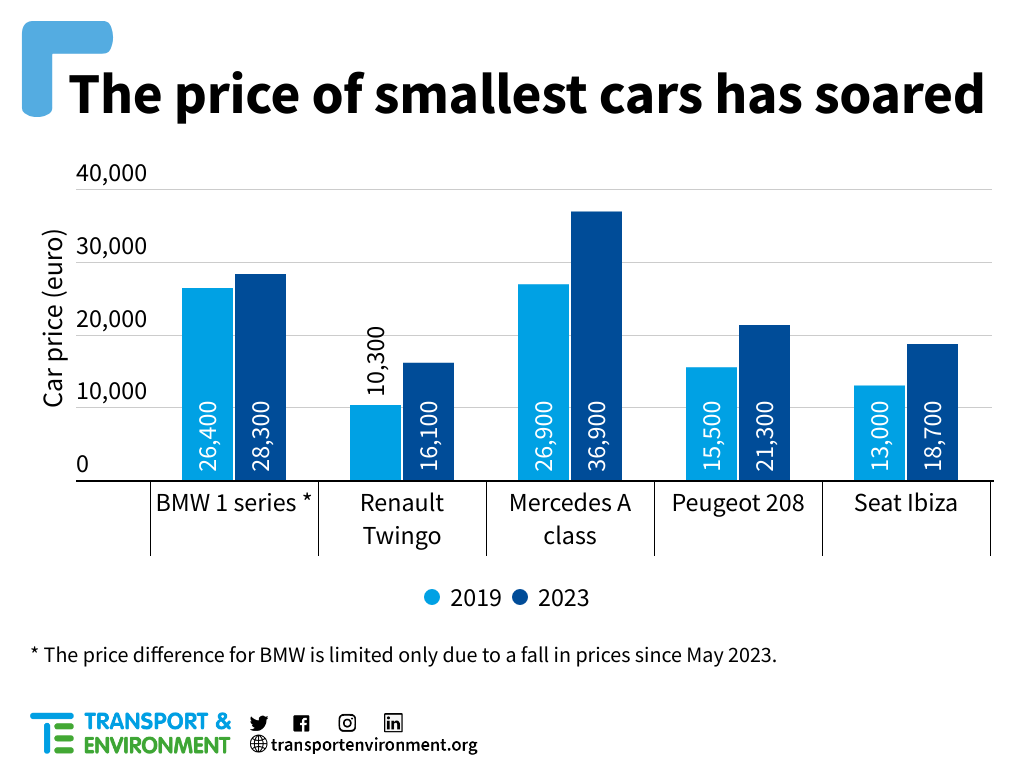Europe’s five biggest carmakers have raised the prices of their cheapest models by an average of 41% since 2019, new analysis of price data shows. Almost double the cumulative rate of inflation during this period. The price of a Peugeot 208, Seat Ibiza and Renault Twingo, has increased by almost €6,000 – a rise of 37-56%; the more premium Mercedes A and B class models increased in price by over €10,000 (up 38% and 37% respectively). Prices have risen far above levels of inflation or the cost of raw materials and other components.

The price hikes saw carmakers make record profits of €64 billion last year, and they issued record share dividends of €27 billion this year. Transport & Environment (T&E), which analysed the data, said this comes at a time when carmakers have fought to derail new anti-pollution measures – the Euro 7 standard – costing €200 per car, claiming it is too expensive for both them and consumers, and will result in unaffordable price hikes.
Anna Krajinska, vehicle emissions and air quality manager at T&E, said: “In some cases, carmakers have raised the prices of their cheapest models by more than half since 2019. That’s a whopping €6,000 extra for a Peugeot 208 or Seat Ibiza. This is way above inflation and other costs, allowing carmakers to make record profits last year at the expense of consumers. Yet they have fought tooth and nail against life saving anti-pollution technologies costing only €200 per car. It’s proof that profit will always come before people for Europe’s carmakers.”
The European Commission proposed a new law, the Euro 7, in 2022 that would reduce pollution from cars, vans, buses and trucks. The proposal would save thousands of lives cut short by air pollution and improve air quality for all European citizens. Yet, the automotive industry launched a relentless lobbying effort to kill off Euro 7. One of the central arguments they make is that it’s too expensive, and will make cars – especially smaller, cheaper models – unaffordable for consumers.
While carmakers have systematically increased the price of their cars, the European Council and the Parliament’s Environment Committee have bought the industry narrative, watering down the European Commission’s original, relatively weak, Euro 7 proposals. Without action to reverse this, 100 million more highly polluting cars will be sold before 2035 and driven on Europe’s roads for decades to come.
Anna Krajinska said: “Carmakers have used the opportunity of an inflationary market to raise prices for consumers beyond inflation to substantially bolster their own profits. At the same time they ran a campaign against cheap and readily available technology that would improve air quality for all. The European Parliament has one final chance to end this gross injustice. It must act in the interests of all Europeans, not just the auto industry.”
The European Parliament will meet in Plenary on 8th November to vote on its final position on Euro 7 before entering into trilogue negotiations with the European Commission and the European Council. This will be the last chance to increase its ambition for both the Euro 7 and public health in Europe.


